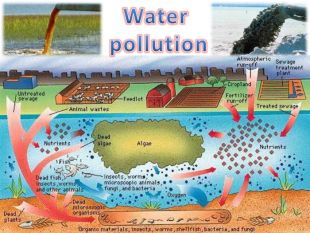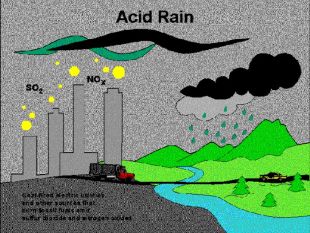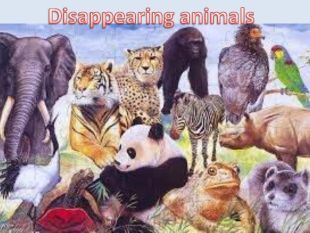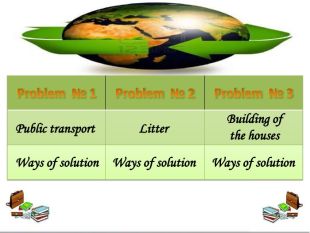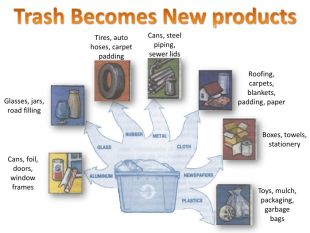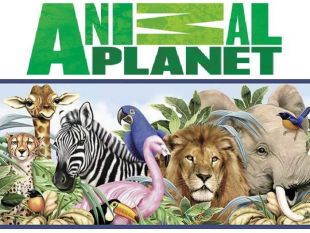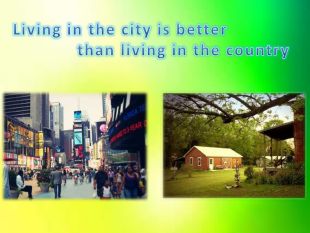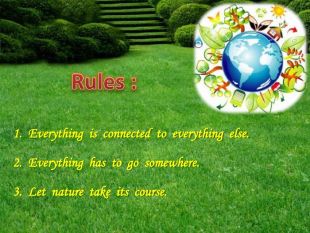Lesson plan (grade11) Environmental problems. Animals.
- Present.pptx pptx
- Urok.doc doc
Урок
Тема: Проблеми навколишнього середовища. Тварини.
Мета: вчити учнів одержувати основну інформацію з прочитаного (прослуханого) тексту; вчити обмінюватись думками; розширювати знання учнів про екологічні проблеми навколишнього середовища; розвивати мовні, інтелектуальні, пізнавальні здібності учнів; фонематичний слух; логічне мислення; уяву; довготривалу пам’ять; здатність логічно, послідовно викладати думки іноземною мовою; виховувати любов до рідного краю та до Матінки-природи.
Обладнання: підручник (Карп’юк 11 клас (поглиблене), дошка, аудіозапис тексту, картка-схема, текст для читання + завдання (тест), аудіозапис, презентація (слайд-шоу).
ХІД УРОКУ
І.Організаційний момент
1.1.Привітання
1.2.Оголошення мети:
T:During the lesson we should be able
-to listen to the text
-to read and discuss the text
-to do some exercises
ІІ.Мовні вправи
T: Look at the blackboard. You can see the poem which will be the
еpigraph of our lesson.
Let’s read it and say what the topic of our lesson is.
(учні читають і відповідають)
Great, wide, beautiful, wonderful world.
With the wonderful water round you curled,
And the wonderful grass upon your breast,
World, you are beautifully dressed.
(Possible answer: The topic of our lesson is ecological problems)
T: Can you imagine our planet without nature?
(на екрані малюнок «земної кулі»)
What must we do to save our planet, the Earth, for ourselves and our
future generations?
(«мозковий штурм» - учні говорять по 2-3 речення)
ІІІ.Основна частина
3.1.Аудіювання тексту “Ecological Problems In Cities”
1)pre-listening
T: But as you know there are a lot of ecological problems nowadays.
Name them. And give a short report about each problems.
(учень називає проблему і розповідає про неї)
-air pollution;
-water pollution;
-land pollution (garbage);
-greenhouse effect;
-acid rains;
-rainforests;
-disappearing animals.
2)while-listening
Установка 1: Listen to the text and say which picture doesn’t match to the
text. Open your books at page 20, ex.30a.
(учні слухають текст перший раз і відповідають, яка картинка
зайва)
Why do you think so?
(because they were mentioned about traffic, litter and building of
the houses)
3)post-listening
Установка 2: Listen to the text once again and answer the question: If you
were the leader of the country, what you would do for your
city to make it cleaner? Use the conditional sentences of the
II type.
(на слайді схема ІІ типу умовних речень.
Учні відповідають за вправою 30б, с.21)
T:I want you to name the problems which have been mentioned in the text
And give the ways of their solutions.
(учні слухаючи текст, заповнюють картку-схему (додаток))
(на слайді схема)
|
Problem 1 |
Problem 2 |
Problem 3 |
|
Public transport |
Litter |
Building of the houses |
|
Ways of solution |
Ways of solution |
Ways of solution |
T: We know that to solve the environmental pollution we must recycle
different kinds of wastes, because it’s common knowledge that trash
becomes new products.
(на слайді малюнок “Trash Becomes New Products”)
3.2.Читання тексту “Love For Sale”
1)pre-reading
T: There have been much said about the problems of the environment. But
can you imagine our planet without animals?
1)What is your attitude to people who take animals to their houses, play
with them and then throw them out as unnecessary things?
2)Have animals got the rights to live in good conditions?
3)Have people got rights to treat animals cruelly?
4)What is your personal opinion about keeping wild animals as pets?
(впр.10,с.28)
2)while-reading
Установка: Read the text and do some tasks after the text.
-find the episode in the text:
a)describing that people spend a lot of money a year to feed their
pets;
b)describing that people spend much money buying different
unnecessary things.
Why do people buy the things of luxury?
(Possible answer: to develop pet industry and to earn money)
LOVE FOR SALE
There is a particular breed of humans who love animals. Some of these people are dog-lovers; others are attached to cats; some prefer horses, fish, or birds. A few love all animals, including mice and snakes. True animal lovers are devoted to keeping their pets safe, happy and healthy. For example, a rich American woman, Mrs.Rockefeller-Dodge, at one time spent $50,000 a year feeding her fifty dogs the finest cuts of meat. Her family finally took her to court to try to stop her from squandering her money in this way. The judge, however, agreed with Mrs.Dodge and she continued treating her dogs to the life style she felt they deserved.
Animal lovers like Mrs.Dodge believe their affection is returned, and they have evidence to
support their belief. Accounts of amazing, often heroic animal behavior suggest that many animals are, in
fact, people - lovers. A canary in Tennessee saved the life of the old woman who fed it; a dog in
Switzerland rescued more than forty people who were in danger of freezing in the mountains; a Japanese
dog continued to meet his master's train for more than ten years after his master had died; off the coast of
New Zealand, ships used to sail safely through a dangerous channel only because they were guided by a
friendly porpoise.
With stories of devotion like these to encourage them, people willingly return their pets' affection by buying them things. Not only do Americans spend more than three billion dollars annually on basics like food, grooming, and veterinarian services, they provide their animals with extras like clothes, jeweled collars, special dishes, beds, and in extreme cases, sunglasses and pet psychiatrists.
No evidence exists to prove that this expensive treatment makes the animals any happier, but it certainly pleases the pet industry. This industry has grown to a healthy six billion dollar business and looks forward to a rosy future. As one pet dealer said, "We offer love for sale. Not many businesses can make that claim".
3)post-reading
-письмове завдання (тест множинного вибору)
Установка: Open your exercise-books. Write the date. And do a test
which is concerned the text.
-перевірка (учні читають по черзі)
TASK TEXT "LOVE FOR SALE"
1 There is a particular breed of humans.,.
a)who do not love animals.
b)who love only mice and snakes.
c)who love all animals.
2.Evidence shows...
a)that animals don't return human affection.
b)that animals need the extras people give them.
c)that animals are people lovers.
3.The judge said Mrs.Dodge....
a)had the right to treat her dogs to the life style she thought it proper.
b)should not spend $50,000 a year on feeding her dogs.
c)did not have the right to treat her dogs to the life style she felt they deserved. 4.Mrs.Dodge's family took her to court...
a)to try to stop her from treating her dogs cruelly.
b)to try to stop her from spending $50,000 a year on feeding her dogs.
c)to make her feed her fifty dogs the finest cuts of meat.
5.Mrs.Dodge's family thought...
a)she treated her dogs to the life style they deserved.
b)her dogs deserved better treatment.
c)she should not spend $50,000 a year on feeding her dogs.
6.Americans spend...
a)more than three millions dollars annually on pets.
b)more than three billion dollars annually on extras for pets.
c)more than three billion dollars annually on basics for pets.
7.The basics for pets include...
a)clothes.
b)psychiatrists,
c)brushes.
8.The extras for pets include...
a)grooming.
b)beds.
c)veterinarian services.
9.Expensive treatment...
a)makes the animals happy.
b)does not make the animals any happier.
c)makes the animals much happier.
10.Pet industry...
a)is highly profitable in the USA.
b)is hardly profitable in the USA.
c)is not profitable in the USA.
Keys: 1c, 2c, 3a, 4b, 5c, 6c, 7c, 8b, 9b, 10a.
3.3.Діалогічне мовлення
T: I want to propose you the situation: “Living in the country is better
than living in the country”. Make up a dialogue and dramatize it.
(imagine that one pupil is a city dweller, another one is a country dweller)
(учні складають діалог за запропонованою ситуацією;
на слайді – ситуація)
ІV.Заключна частина
4.1.Домашнє завдання
-написати твір на тему: “Rivers and rocks and trees have always been
talking to us, but we have forgotten how to
listen”.
4.2.Виставлення та коментар оцінок:
-самооцінювання;
-взаємооцінювання.
4.3.Підведення підсумків уроку.
T: Let’s make a summary of our work at the lesson.
What have you learned new from the lesson?
-spending a lot of money on keeping pets;
-problems of big cities;
-trash becomes new products.
4.4.Заключне слово вчителя.
Т: Don’t forget that the Earth is our home and to preserve it we should
remember three simple laws of ecology suggested by Barry Commoner,
biologist, in his book “Making Peace with the Planet”.
The 1st rule is: ”Everything is connected to everything else”.
(Все в природі взаємопов’язане)
The 2nd rule is: “Everything has to go somewhere”.
(Все має на щось перетворюватись)
The 3rd rule is: “Let nature take its course”.
(Нехай природа живе за своїми законами)
And I wish you to live in harmony with our beautiful nature and protect
it for our future.
Thank you for your work. Stand up, please. The lesson is over.
Good-bye. You are free.
Card
|
Problem 1 |
Problem 2 |
Problem 3 |
|
|
|
|
|
Ways of solution
|
Ways of solution
|
Ways of solution
|
Card
|
Problem 1 |
Problem 2 |
Problem 3 |
|
|
|
|
|
Ways of solution
|
Ways of solution
|
Ways of solution
|


про публікацію авторської розробки
Додати розробку


























